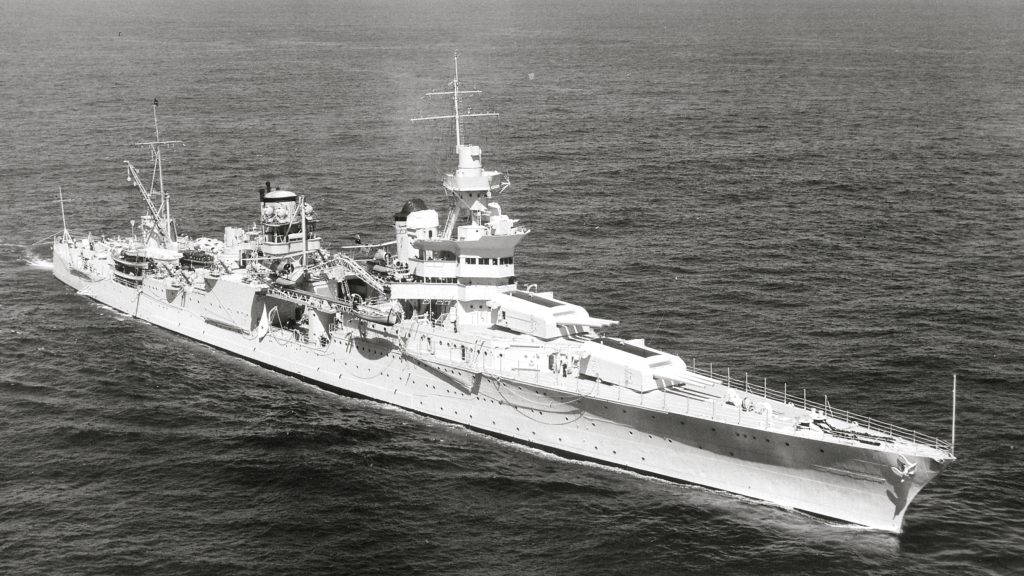by Ryan Yablonski

The USS Indianapolis was stuck by two torpedoes on July 30th, 1945, fifteen minutes after midnight. This was just three days after it had delivered the components and the scientists that would make the atomic bomb drop on Iwa Jima possible. Strange cosmic tides seem to have swept the ship as it departed. Captain Charles B. McVay III was largely let down by intelligence officers who had not warned him that Japanese submarines were lurking along the way from Guam to Leyte. He was not given the Fifth Fleet’s usual anti-submarine escort, and messages about the Indy’s plans to arrive in Leyte were not transmitted smoothly. Nobody was expecting the Indianapolis, nor was anyone alarmed when it did not arrive. It was largely because of these failings and more that there was no formal search for survivors until it was far too late.
One of these survivors was named Adolfo Celaya. He was born and raised in Florence, Arizona and joined the US Navy in 1943. After finishing basic training he and his class boarded the Indianapolis in the middle of the night. On March 31st, 1945 the ship had taken an impact from a kamikaze plane in stride, once again adding to its impressive reputation.
It had returned to port where, in addition to a mechanical refit, a fresh crew was also cycled on. Celaya was part of the new crew which returned the ship to the Pacific with renewed vigor. Adolfo remarked that the ship was so incredibly large and intimidating that if he had seen it in daylight he would have never agreed to come aboard. Adolfo crossed the threshold, a very different man than as he would emerge.
Celaya was given the rank of fireman and was tasked with the laborious job of feeding the ship’s boilers with coal. The Indianapolis had 8 boilers feeding 4 turbine engines which accounted for its record breaking speed run across the Pacific. The metaphysical truth however was that it was a small army of dedicated men like Adolfo truly who powered the ship. As a fireman, Adolfo was likely underneath the deck when the ship was hit.
Amidst the fiery chaos, Adolfo leapt over the rails to abandon ship. As he did so he recalled striking another man as they fell to the water. He was sure he had caused his friend’s death in the collision. Celaya remarked that at first when the men hit the water they were all strangers. Having been covered in oil and debris, nobody could tell who was what race or rank. Days later amongst the drift he heard one voice call out in his native Spanish. It was Santos Peña, his friend whom he had struck as he was fleeing the boat. Somehow he had found him afloat and still alive. Adolfo recalls that, as the days went on, men became taken with madness, delirious and desperate. The equatorial sun blazed down from above and sharks attacked from below swarming in greater and greater numbers each day.
Life rafts became precious and scarce. Adolfo felt abandoned by the higher ranking command who held life jackets and rafts for their safety. Celaya recalls being attacked for his raft by fellow survivors who attempted to pull rank or division or any means possible to escape the water. There were times when he thought he was nearly ousted from his boat which would have meant certain death. However, together with Peña, they secured each other’s safety until they were eventually spotted by a surveillance pilot. The pilot, who was named Chuck Quinn, began a backyard barbecue legacy group which Adolfo Celaya and other veteran survivors attended on an annual basis. This article series will endeavor to recreate a similar community in the digital space.
One of the unique wrinkles of the story of the USS Indianapolis that we will revisit is the way that race and rank had an effect on the stories of survival. It was less likely that lower ranking sailors were able to escape the ship as they were physically positioned lower in the ship in operational and mechanical jobs. Higher ranking officers were above the water on the bridge at the moment the torpedoes impacted and the ship’s fuel supply began to ignite. Survivors like Celaya were uniquely blessed, their fate secured by solidarity.

Amazing recount of events. Very well written. Looking forward to reading the series from this writer.